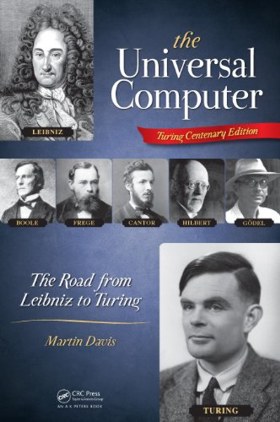|
If you need to know what's important for the developer, you can rely on I Programmer to sift through the news and uncover the most interesting stories. Our weekly digest also covers the week's articles, books reviews and additions to Book Watch.
To receive this digest automatically by email, sign up for our weekly newsletter.

5 - 11 July, 2018
Book Watch
This week's additions to our ever-growing archive of newly published computer books are:
Book Reviews
News
Ten Years Of The Apple App Store Wednesday 11 July
Ten years of the App Store - is it time to celebrate? Or is it time to reflect back on what we have lost and what has been gained?
|
|
Python Passion For Assignment Expressions - PEP 572 Wednesday 11 July
You would think with a language as old as Python there wouldn't be much left to get excited about, but over the past few months PEP-572, a proposal to add a new feature, has been raising the blood pressure of the Python community.
|
|
Open Source GraphQL Engine Launched Wednesday 11 July
An open source GraphQL Engine has been launched that can be used with applications based on Postgres without the need for backend GraphQL processing code.
|
|
Augmented Reality - A Primer On Coursera Tuesday 10 July
A short course from Google on the Coursera platform introduces augmented reality (AR) and Google's ARCore. Available for free, it starts on July 16th and lasts four weeks.
|
|
The GNOME Foundation Is Hiring Tuesday 10 July
Thanks to a donation of up to $1,000,000 over the next two years the GNOME Foundation is recruiting for four positions including one for a core developer of the GTK+ toolkit and another for a DevOps Engineer/SysAdmin.
|
|
Google Launches Data Video Series Monday 09 July
The Google Analytics team has launched a video series called Measure Matters that looks at best practices on using Google Analytics with data. While some of the topics sound rather too 'marketeery', others have info of interest to developers.
|
|
MapR Adds Data Tiering Monday 09 July
MapR has added data tiering to its new release, along with access via the S3 API and the ability to run Kubernetes-based apps without changing the container images.
|
|
Add An Airbag To Your Mobile Sunday 08 July
This ingenious protective case for a mobile phone is a great example of thinking outside the box. The design relies on feedback from sensors that detect that it's falling. Now why didn't we think of this sooner? It would have saved thousands of devices from being trashed.
|
|
The Writing's On the Sand Saturday 07 July
Who hasn't taken a stick to sign their name in the sand - or in the case of one of the I Programmer team scrawl equations? An inventive creator and 3D printing enthusiast has built a beach printer that writes messages that stand out! See it in action in his video.
|
|
More CS50 Courses on edX Friday 06 July
HarvardX has released three new self-paced courses that follow on from David Malan's highly acclaimed Introduction to Computer Science MOOC, CS50x. Free on edX, they cover web programming, mobile app development, and game development respectively.
|
|
Excel Adds New Data Types Friday 06 July
New types have been added to Excel that rely on AI to recognize rich data types such as countries. The first data types to be added are Stocks and Geography, but more will be added in the future.
|
|
Threat To Internet Staved Off Until September Thursday 05 July
Wikipedia blacked out in parts of Europe this week to protest against the copyright reforms that the European Parliament was due to vote on as part of the # SaveYourInternet campaign. This can be counted a success as a majority of MEPs voted for further scrutiny and debate of the proposals.
|
|
Git Adds Protocol Version 2 Support Thursday 05 July
Support for Git Wire Protocol Version 2 has been added to the latest version of the Git client. Git Wire Protocol controls how clones, fetches and pushes are communicated between clients and servers.
|
The Core
Programmer's Python - Metaclass Monday 09 July
 Metaclasses are an advanced topic and you generally don’t need to know about them or make use of them .....but knowing how they work might suggest alternative approaches to many problems. This extract is from my new book published on July 9th with the subtitle "Something Completely Different". Metaclasses are an advanced topic and you generally don’t need to know about them or make use of them .....but knowing how they work might suggest alternative approaches to many problems. This extract is from my new book published on July 9th with the subtitle "Something Completely Different".
|
History
Pre-History of Computing Thursday 05 July
 When was the dawn of computing? We tend to date it from the middle of the 20th century when the first programmable computers were built in the UK, the USA and also in Russia and Germany. Prior to that "computers" referred to people who performed calculations - and in this article we look at the history of making calculations. When was the dawn of computing? We tend to date it from the middle of the 20th century when the first programmable computers were built in the UK, the USA and also in Russia and Germany. Prior to that "computers" referred to people who performed calculations - and in this article we look at the history of making calculations.
|
To receive this digest automatically by email, sign up for our weekly newsletter.
Follow us on Twitter, Facebook, Google+, and LinkedIn.
You can also subscribe to our RSS Feeds - we have one for Full Contents, another for News and also one for Books with details of reviews and additions to Book Watch.

<ASIN:1617294039>
<ASIN:1788294874>
<ASIN: B07BYBMGQT>
<ASIN:1617293768>
<ASIN:1680502875>
<ASIN: B07CLFTVZS>
<ASIN:1466505192>
<ASIN:B00846EAT4>
<ASIN:1871962587> |


 Metaclasses are an advanced topic and you generally don’t need to know about them or make use of them .....but knowing how they work might suggest alternative approaches to many problems. This extract is from my new book published on July 9th with the subtitle "Something Completely Different".
Metaclasses are an advanced topic and you generally don’t need to know about them or make use of them .....but knowing how they work might suggest alternative approaches to many problems. This extract is from my new book published on July 9th with the subtitle "Something Completely Different". When was the dawn of computing? We tend to date it from the middle of the 20th century when the first programmable computers were built in the UK, the USA and also in Russia and Germany. Prior to that "computers" referred to people who performed calculations - and in this article we look at the history of making calculations.
When was the dawn of computing? We tend to date it from the middle of the 20th century when the first programmable computers were built in the UK, the USA and also in Russia and Germany. Prior to that "computers" referred to people who performed calculations - and in this article we look at the history of making calculations.